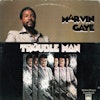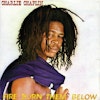It’s easy to forget how quickly love faded from the scene—how in the proverbial blink of an eye, the whole flower power, make-love-not-war trip of the 1960s disintegrated into the cynical, Nixonian dystopia of the early 1970s.
Nothing exposed that shift quite like blaxploitation films, a genre made primarily by and for Black people, often with little money or studio backing. Depending on one’s politics, the films either showed the reality of life in the ghetto or pointlessly glorified violence, hard drugs, and immorality. Into this scene stepped Marvin Gaye in 1972.
Gaye was fresh off recording one of the strongest social and political statements ever made by a musician (1971’s What’s Going On) when he began work on a soundtrack for the movie Trouble Man. Although the film was panned—the New York Times called it “horrible”—the soundtrack survived. And, while it is not as famous as Curtis Mayfield’s Super Fly or Isaac Hayes’s Shaft, it deserves to be in the same category as those seminal soundtracks.
Though he was primarily a soul artist, Gaye was able to stretch his musical legs with Trouble Man. The opening track, “Main Theme From Trouble Man,” starts with a beat reminiscent of his duet with Tammy Terrell, “What You Gave Me.” But as the drums build to a crescendo that would normally resolve into another Marvin Gaye shuffling soul number, the song turns down a side street and ends up at the doorstep of jazz. The jazz influence gets stronger as the album progresses, oozing out of the sultry saxophone on songs like “Poor Abbey Walsh.” But this is not a jazz album. “‘T’ Plays It Cool” is funky as all hell and one of Gaye’s greatest compositions, utilizing a synthesizer back when such a thing was still relatively novel. “Cleo’s Apartment” showcases Gaye’s incomparable voice, which can go from syrupy smooth to raw hollering and back, and even though the song has no lyrics—it is mostly just “oohs” and “aahs”—Gaye tells a rich story just with the intent in his voice.
The album’s heart, though, is the song “Trouble Man.” When Gaye sings, “I didn’t make it, sugar, playing by the rules,” he summarizes the plot of every blaxploitation film. Then he gives the definitive description of the reality behind them: “There’s only three things that’s for sure: taxes, death, and trouble.”


